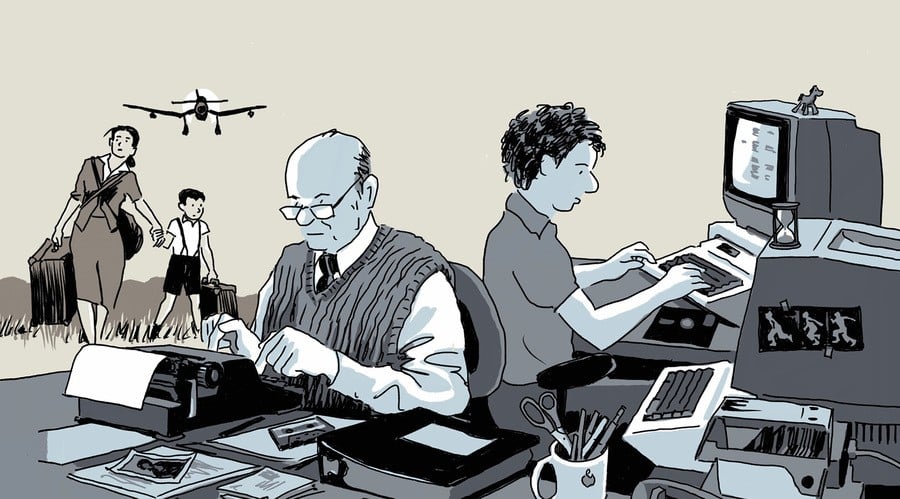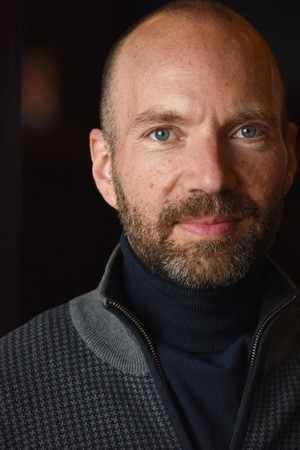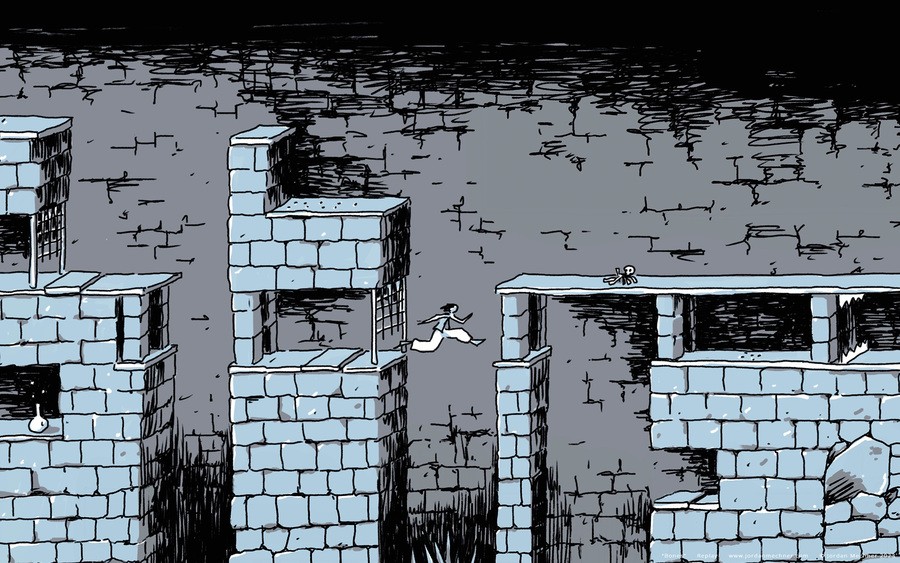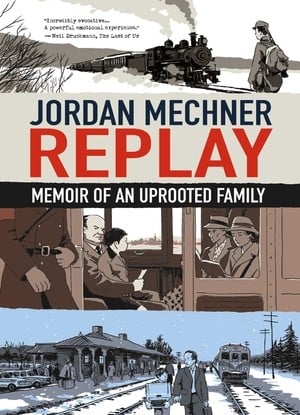
In 1938, Franzi Mechner, at just seven years old, was separated from his parents while fleeing from Nazi-occupied Austria. Travelling with his aunt Lisa, he spent the next three years evading the Gestapo across Europe, before eventually reuniting with his family in 1941.
Flash forward to 2024, and we're talking to his son Jordan Mechner over a video call one evening in March. Jordan is probably best known to our readers as the creator of video games like Prince of Persia, Karateka, and The Last Express, but is currently in the process of promoting a new graphic novel/memoir called Replay: Memoir of an Uprooted Family.
'Replay' aims to document the experiences of three separate generations of his family, retelling his father's remarkable childhood hiding from the Nazis, his grandfather's experiences as a refugee in Cuba, and his career as a game developer and his attempts to get a new Prince of Persia game off the ground in 2015.

These are topics that may not seem related at first (indeed, Jordan once considered them as material for three separate books) but when presented together, manage to provide some remarkable new context behind his work.
Jordan tells us, for instance, that many of his games are simply "taking this family legend and transforming it to another time and place", and this is explored in the book on several occasions. At one point, to give you an example, he draws a parallel between the prince's journey in Prince of Persia to his father's experiences as "a fugitive from a foreign land", while in another he alludes to how The Last Express was, among other things, an exploration of his own European heritage (his aunt and father actually took the same train back in 1938).
Jordan has already given some fairly detailed accounts of his experiences making Karateka and Prince Of Persia in his journals and also collaborated with Digital Eclipse last year on the fantastic interactive documentary The Making of Karateka. But he claims that the difference with Replay is that fans will finally get to see some of the important "human context" behind many of the names that appear in those other places and will also get a deeper understanding of how his family's history and his games intersect.
"I feel honoured that [Digital Eclipse] put so much love, time, and energy into telling this story [in the Making of Karateka]," says Jordan. "However, I think people who read Replay will appreciate certain episodes on another level because they know more of the backstory than other people. For the first time, they’ll see who these people are because my brother, my dad, Tomi Pierce (my colleague) are all mentioned in my journals and The Making of Karateka. In Replay, you really find out who they are and you can see them and you can see these moments. Really what you see in the journals and The Making of Karateka are the artifacts that were left behind, but in Replay, I really tell this as a story."
Part of the reason why Jordan can cover these events in such extraordinary detail is due to his family's habit of meticulous notetaking and journalling — something he also inherited as a teenager. As he tells us, his grandfather spent much of his retirement writing a family autobiography and also kept plenty of photos, letters, and postcards throughout the years to give an insight into his experiences spent in Cuba. Jordan's job with the book, therefore, was to comb through all of this material and try to find a way of weaving these three tales together — something he achieves by focusing on three separate journeys each character must take.
At the start of the book, we see Jordan about to relocate from the US to Montpellier, France to work on a new Prince of Persia project at a time when his relationship with his (then) wife is going through a rough patch. This is then paralleled against his relatives' attempts to flee Nazi-occupied Austria — an event which similarly sees a family being divided across different continents (albeit under much more serious circumstances).

We asked Jordan why he chose to cover these three stories within a single book and he told us that, as he started writing it, it just became more and more evident that he could only tell his grandfather’s and father’s story by also telling his own. In his words, "We can’t ever really tell somebody else’s story. We can only tell our own. And the story I had to tell was in part the story of growing up as an American kid with European family roots and growing up in the shadow of what the previous generation had lived through and survived."
That's not to say he wasn't nervous about how people might perceive his sections of the book, with the game developer being self-conscious that some people may find his story "uninteresting" in comparison to that of his father and grandfather.
"When my grandfather was a teenager in the trenches in WW1 and when my father was an 8-year-old Jewish refugee hiding from the Gestapo in France, their lives were in danger," he explains. "The most exciting thing that ever happened to me was making video games. I thought, ‘How can you put these things together?' But, at the same time, I knew that some readers would be coming to this book because they’re interested in the creation of video games or because they’d played Prince of Persia and were curious about how that got made.
"And in a way, you could say that, like many children of immigrants and refugees, our grandparents and parents survived and went through hardship so that their children wouldn’t have to. And so that their children could have the luxury of growing up and putting their attention into something like, in my case, making video games."

According to Jordan, ever since he first decided to tell these stories, he always envisioned them as a graphic novel, being inspired by the works of authors such as Will Eisner, Guy Delisle, Art Spiegelman, Marjane Satrapi, Riad Sattouf, and countless others. However, he wasn't entirely sure whether he had the skills to draw it himself.
As a child, he was an avid illustrator and had even made his own parody of MAD magazine that he sold in the schoolyard (the proceeds of which he used to buy his first Apple II). However, he had concerns that as an artist his skills weren't necessarily up to scratch and that he may need to collaborate with a professional illustrator — as he had done previously on 2013's Templar.
"In the beginning, I was thinking that perhaps I would write it and then find an artist who could draw it," says Jordan. "Because I didn’t think that my own artwork would be up to the challenge. But about 15 years ago, when I started to do graphic novels as a writer, working with artists on books like Templar (and more recently Monte Cristo), I also started sketching and drawing from life in sketchbooks I carried around with me. At first, this was a hobby, but after 15 years of drawing every day, I realized that my drawing had gotten to the point where I could draw a graphic novel.
"It was another step up to be able to do Replay. And on some level, I knew, because I was drawing my family and the people that I knew and scenes that only I remembered, I was the only person who could draw it. I could never be satisfied with another artist’s interpretation because they weren’t there."
As we come to the end of our interview, we ask Jordan a couple of final questions. The first is about Prince of Persia and his involvement with the series today, following the cancellation of the project covered in Replay and the release of Prince of Persia: The Lost Crown (which he didn't work on). In response, he tells us that is very open to working on the series again but would want to have more of a hands-on role, should he ever find himself attached to another project.
As he puts it, "As far as the creative process of making a game, I’m either in the team or I’m rooting for the team. There’s no real in-between where you’re not part of the team, and yet give input. That role doesn’t exist and it shouldn’t."
We also asked Jordan, whether he would consider collaborating with Digital Eclipse again, suggesting the idea of a follow-up to The Making of Karateka based on his 1997 adventure game The Last Express, which has a bit of tumultuous history. Again, he seemed open to the idea but had some thoughts on how a project like that should be handled.
"I think if Digital Eclipse or a group of game historians are motivated and willing to put in the huge amount of work that it takes to tell The Last Express story, I’ll be happy to share my part. But, of course, unlike Karateka and Prince of Persia, The Last Express was the work of a large team over 4 years. So I think what would make that project interesting is for as many members of the team as possible to bring their voices and tell their part of the story."
If you fancy checking out Replay, it is available to buy now in the US from Macmillan's website and will also be sold on Amazon UK, Amazon US, and Waterstones from April 22nd onwards.

